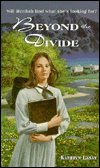Fourteen year old Meribah is part of an Amish family that is falling apart because her father has been shunned by the elders. Meribah leaves her family behind to head west with her father and make a new life for herself.
The setting is definitely key to this story. It starts in the Amish town of Holly Springs, but moves to the rugged land of the undeveloped west. This harsh environment forces people to act and behave in ways that they wouldn�t normally. Two entirely different people, like Meribah and Serena become friends. People are forced to think only of themselves, such as when Meribah�s wagon group decides to desert her and her sick father in order to save themselves (Lasky 228). The setting is vividly described. �The land suddenly flattened, and the sky seemed everywhere. There was an occasional tree� with the tall thick prairie grass shielding the two of them from the hugeness of it all� (Lasky 54).
Although Meribah lived in a much different world than we do, it�s not hard to identify with her. She makes the difficult decision to go with her father and chooses one parent over the other. This is something many teens today have to deal with due to the high divorce rate. She feels trapped in her small community and wants to see the world � something just about every high school senior can identify with. She struggle to stay true to her beliefs, but also fit in. We see this struggle as she anguishes over using �you� instead of �thou� to address others (Lasky 23). Meribah is kind and na�ve. �She grows from a passive child who relied on a community for her needs to a fiercely independent young woman� (School Library Journal 1987). She is revealed through her thoughts, speech and actions. Her father, Will, is an important minor character. He is also kind and patient. Like Meribah, he feels confined by the Amish community. He is Meribah�s guide and role model and always steers her in the right direction.
The plot is interesting and realistic to the time period. The conflict consists of Meribah versus herself, trying to stay true to her identity, yet fit in at the same time. Another conflict is dealing with the harshness of the wagon trail and with the other people. Not all are kind. Serena is raped by two of the men and then shunned by her own father, an unkind man to begin with. Meribah�s father gets an infection from a cut in his hand and therefore the group leaves the two of them behind. Will eventually dies and Meribah is left on her own while her new friend, Goodnough, a map maker, goes to get help. Meribah survives with the help of some Native Americans and is basically adopted by them. Goodnough eventually returns, but Meribah decides she needs to go to a valley that she has seen because she knows that�s where she belongs. The reader is left with the impression that Goodnough will eventually join her in the valley after his work is done. Everything grows out of the characters� personalities and actions.
The theme is the importance of family love and also the importance of growing up and finding oneself. We see the bond between Meribah and her father. They love and trust each other and it�s doubtful they would have made it as far as they did without each other. We also see how Meribah grows up, learns about herself and finds what she wants and where she belongs.
The story is told in third person point of view, with a narrator who knows Meribah�s thoughts and feelings. We are also able to see Goodnough�s thoughts and feelings at the ened of the story. The author does a good job of showing Meribah and her father�s unique way of speaking, but also showing that they have thoughts and feelings that are just like anyone else�s. The writing Is balanced between dialogue and descriptive passages describing the landscape or Meribah�s thoughts. After a conversation between Meribah and Captain Griffith about his decision to leave her and her father behind, Lasky writes �Meribah watched them climb into their wagons, each wrapped in his own self-righteous logic and bitter dreams. She suddenly felt separate from them all, as if she were another species (Lasky 228).
�Lasky uses a pioneer trek to California as a metaphor for growing up, in a richly textured historical novel� (Booklist 1988).
Booklist. 1988. Booklist. In Books in Print [database online]. Available from
http://www.booksinprint.com/bip. Accessed 22 November 2004.
School Library Journal. 1987. School Library Journal. In Books in Print [database online]. Available
from http://www.booksinprint.com/bip. Accessed 22 November 2004.
